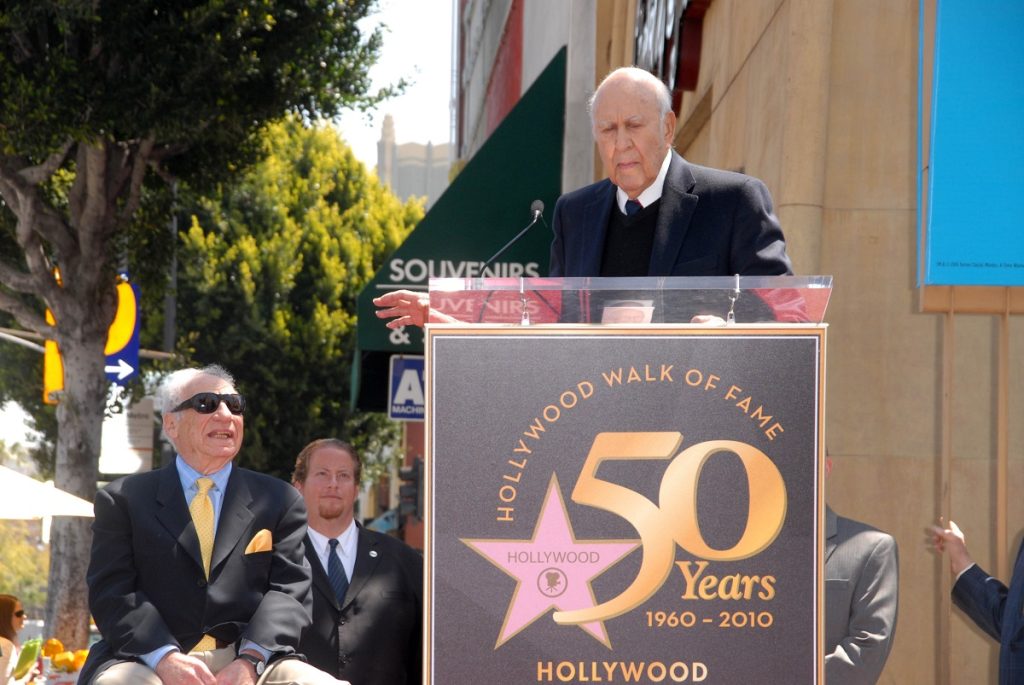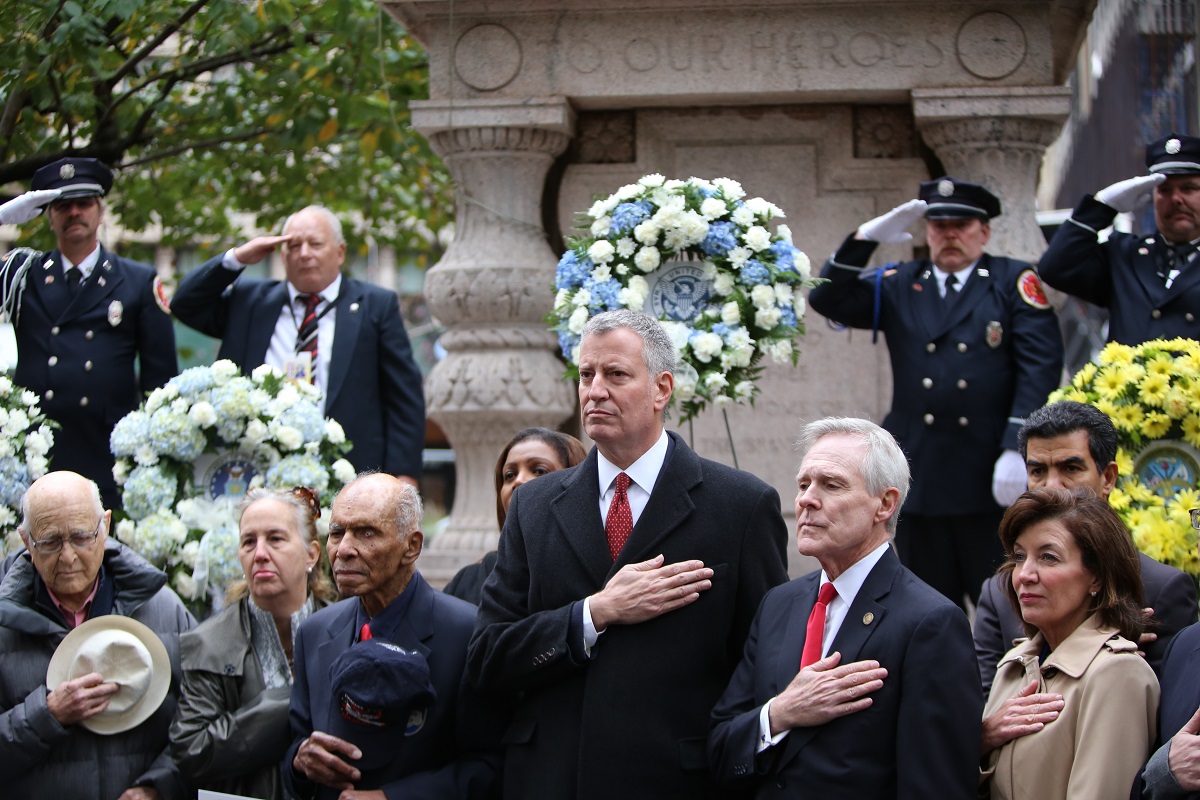A commemorative speech aims to inspire the audience as they think about the life and achievements of a person at times such as their birthday, anniversary, or death. Commemorative speech examples show how to remember an event, company, or occasion.
A commemorative speech (also known as an epideictic or ceremonial speech) pays tribute to a person, a group, or an institution. It can also spotlight a momentous event that has happened in the past.
Public speaking and speech writing professionals usually deliver or write this type of speech during or for special occasions, such as anniversaries, graduations, retirement parties, memorial services, dedications, and award ceremonies.
Why Are Commemorative Speeches Given?
Commemorative speeches can contain elements of an informative speech, persuasive speech, motivational speech, and even extemporaneous speech. However, the main purpose of this special occasion speech is to celebrate human values and, ultimately, spark inspiration and hope.
In a tribute speech, a type of commemorative speech, the aim is to commemorate the accomplishments of the subject and their impact on the community or society. In a eulogy, the highlight is the legacy and positive attributes of the deceased. In a retirement or graduation speech or a farewell speech, the piece emphasizes achievements and inspires the audience to look ahead with hopeful eyes. Meanwhile, an award acceptance speech spotlights the recipient’s feat and the people who helped them achieve it.
There are various types of ceremonial speeches. But by the end of effective commemorative speeches, speakers would want to uplift the audience’s emotions, making them feel optimistic about the future. Their goal is for the audience members to remember the things they’ve discussed on a good note and let their speech resound positively even well after they delivered their piece.

What Is The Structure Of A Commemorative Speech?
A commemorative speech outline follows the structure of just about any kind of speech. It has:
- An introduction. The intro presents your topic, its relevance, and your purpose. It’s also a suitable time to capture your audience’s attention.
- A body. After the intro, you will discuss your main points, complete with supporting proof (in the form of anecdotes, personal stories, expert opinions, and studies).
- A conclusion. A good commemorative speech ends with a conclusion summarizing the vital points you touched upon. Your goal here is for your audience to remember your core message.
How Do You Start A Commemorative Speech Example?
Writing commemorative speeches is challenging. After all, you’re tasked to hit a big goal: to celebrate something or someone and evoke positive feelings among the audience members.
You might ask: How do you begin writing a truly inspiring commemorative speech?
First, you must choose a theme in line with the person, group, institution, or event you’re commemorating. For instance, if you’re delivering a speech paying tribute to war comrades, your theme can be human courage and resilience.
Then, you can brainstorm with your peers for commemorative speech ideas. Doing such sessions will also help you gain insights into how you will frame your narrative in a way that cohesively conveys your key messages. Discussing your speech with others can also aid you in gathering perspectives and research materials to strengthen your speech’s impact.
Afterward, you can craft an outline following the structure above. Remember that you need to have a great attention-grabber in the intro. Whether you’re telling a story recounting a past happening, presenting a “what if” scenario, or stating an interesting fact, you intend to hook your audience to stay with you until the end. You can even use figurative language to help build a personal connection or creatively pique the audience’s curiosity.
What Is The Tone Of A Commemorative Speech?
There’s no definitive writing guide when it comes to the tone of a commemorative speech, as your piece will depend on the specific occasion and your relationship with the subject, among others. For instance, you can inject an appropriate sense of humor in a eulogy if you’re close with the deceased and the audience members.
However, generally speaking, your speech should have a positive tone. It should sound respectful, reflective, and inspiring.
What Does A Commemorative Speech Examples Cover?
While commemorative speeches follow the intro-body-conclusion template, many distinctive elements comprise this type of speech.
Throughout the speech, you can pepper your narrative with a personal touch, sharing stories, experiences, and memories relevant to the subject. This will help you humanize the topic and create a stronger, deeper personal connection with the audience.

In the speech, you must also cover the great qualities and milestones of the person, group, thing, or event you’re commemorating. The goal is not just to share their achievements and turn the limelight on their impact and influence. More importantly, you want these things to uplift your audience members and inspire them — and even yourself — to make their and your legacy.
In this speech by Katherine Gosvener, voted third best at Northwest University’s Advanced Speech course, she paid tribute to her deceased grandmother. Here’s how her introduction went:
“Anticipation fills the air as our old blue minivan turns onto LeFebvre Way, the street where grandparents live. Time seems to move a little slower as we pull up to the house my grandparents have lived in since their children were little, the house my grandfather built. It’s Spring, so the lawn has been mowed, and all the plants are green and beautiful. After we park the van, I step out and breathe in the fresh scent of flowers. As I look around, I see the source of the aroma: the gardenias my grandmother had planted, her favorite. Before we’ve even started walking toward the door, Grandma LeFebvre bursts through the front door with her usual greeting: ‘Hello There! Hello!'”
These are the memories that I have missed since my grandmother, Florence MacBurney LeFebvre, passed away two years ago on April 5, 2005.”
In the body, she brought up stories about flags, potato salad, and grandma’s love of the cowboy who became her grandfather that depicted the characteristics of her deceased loved one.
She concluded her piece with this powerful conclusion:
“The separation that her husband, children, and us grandchildren have experienced has been difficult. However, it is a comfort to remember that she became a Christian in a little church in Pinole 33 years before she passed away. I have great joy in the knowledge that someday, I will be reunited with her. I only hope that when I become an old woman, my husband can say that I am endearing, my children can say I’m an encouragement, and my grandchildren will know that I’m enamored with them. I know that when I reach the end of my days, she will be right there at the door of Heaven with the long-awaited greeting: ‘Hello There! Hello!'”
What Are Some Commemorative Speech Topics?
When selecting commemorative speech topics, you must choose something that genuinely matters to you. Even casual listeners can detect whether you’re speaking from the heart. So, make sure that your topic is something that you can authentically talk about.
Also, while you need not be an expert on it, you must have a sufficient understanding of your subject matter. It will help you confidently deliver your piece. Moreover, you must choose a topic that’s relevant to your audience.
Here are some topic ideas to kickstart your research and selection process.
- Your ultimate hero or mentor (it could be a family member or your high school teacher)
- A tribute to your favorite place
- A look at a loved one’s life and legacy
- Your childhood or upbringing
- Your family or marriage life
- Your career or dream job
- A prominent event in your neighborhood city
- An event that shaped your country
- A transformative movement (for example, the civil rights movement)
- A tribute to an important historical figure
- A tribute to someone who overcame a difficult challenge
- An example of positive human traits (e.g., hard work, loyalty, resilience)
What Are Some Famous Commemorative Speech Examples?
Finding inspiration for a commemorative speech is easy, thanks to the abundance of commemorative speech examples you can read online. Here are some of them.
Remarks by President Barack Obama at the Martin Luther King Memorial Dedication
“Our work is not done. And so, on this day, in which we celebrate a man and a movement that did so much for this country, let us draw strength from those earlier struggles. First and foremost, let us remember that change has never been quick. Change has never been simple or without controversy. Change depends on persistence. Change requires determination. It took a full decade before the moral guidance of Brown v. Board of Education was translated into the enforcement measures of the Civil Rights Act and the Voting Rights Act, but those 10 long years did not lead Dr. King to give up. He kept on pushing; he kept on speaking, he kept on marching until change finally came.”
Steve Jobs’s Commencement Speech at Stanford University
“Your time is limited, so don’t waste it living someone else’s life. Don’t be trapped by dogma — which is living with the results of other people’s thinking. Don’t let the noise of others’ opinions drown out your own inner voice. And most important, have the courage to follow your heart and intuition. They somehow already know what you truly want to become. Everything else is secondary.”
Oprah Winfrey’s Acceptance Speech for the Cecil B. Demille Award at the Golden Globe Awards
“I want all the girls watching here and now to know that a new day is on the horizon! And when that new day finally dawns, it will be because of a lot of magnificent women, many of whom are right here in this room tonight, and some pretty phenomenal men, fighting hard to make sure that they become the leaders who take us to the time when nobody ever has to say, ‘Me too’ again.”

